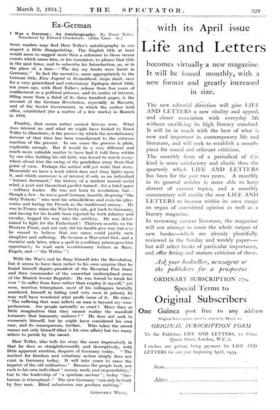Ex-German
Was a German : An Autobiography. By Ernst Toiler. Translated by Edward Crankshaw. (John Lane. 58.) SOME readers may find Herr Toiler's autobiography in one respect , a little disappointing. The English title at least would seem to suggest more than a reference to those recent events which cause-him, or his translator, to phrase that title in the past tense, and to subscribe his Introduction, as, or in the place of, a date—" The day my books were burnt in Germany." In fact the narrative, more appropriately to the German title, Eine Jugend in Deutschland, stops short, save for a very generalized and exhortatory Epilogue dated 1933, ten years ago, with Herr Toiler's release from five years of confinement as a political prisoner, and its centre of interest, filling more than a third of its three hundred pages, is the account of the German Revolution, especially in Bavaria, and of the Soviet Government, in which the author held office, established (for a matter of a few weeks) in Munich in 1919.
Frankly, that seems rather ancient history now. What does interest us, and what we might have looked to Ernst Toiler to illuminate, is the process by which the revolutionary fervour of that time has been transformed to the extreme reaction of the present. In one sense the process is plain, explicable enough. But it would be a very different and much more valuable matter to have had it told from within by one who, holding his old faith, was forced to watch every- where about him the swing of the pendulum away from that point of view. Perhaps the author will yet write that story. Meanwhile we have a work which does cast stray lights upon it, and which moreover is of interest if only as an individual " human document," the history of a student turned social rebel, a poet and theoretical pacifist turned—for a brief space —military leader. He was not born to revolution, but— though a Jew—he was a good German, heartily despising "the dirty Polacks " who were his schoolfellows and even his play- mates and hating the French as the traditional enemy. He was in France when the War broke out, got back to Germany, and having for his health been rejected by both infantry and cavalry, begged his way into. the artillery. He was deter- mined to fight for the Fatherland ! Thirteen months on the Western Front, and not only did his health give way but a:so he ceased to believe that any cause could justify such slaughter and suffering. He became a War-rebel first, and a Socialist only later, when a spell in a military prison gave him opportuaty to read such revolutionary writers as Marx, Engels, and--" the Webbs " I
With the War's end he flung himself into the Revolution, but, it seems to have been rather to his own surprise that he found himself deputy-president of the Bavarian Free State and then commander of the somewhat undisciplined army of the Munich Soviet Republic. He was forced to break his vow " to suffer from force rather than employ it myself," yet soon, reaction triumphant, most of his colleagues brutally murdered, himself in hiding (and very soon in prison), he may well have wondered what profit came of it. He cries : " The suffering that man inflicts on man is beyond my com- prehension. Are people naturally so cruel ? Have they so little imagination that they cannot realize the manifold torments that humanity -endures ? " He does not seek to exonerate himself, but he might have considered his own case, and its consequences, further. Who takes the sword causes not only himself (that is his own affair) but too many others to perish by the sword.
Herr Toiler, who tells his story the more impressively in that he does so straightforwardly and descriptively, with little apparent emotion, despairs of Germany today. " The instinct for freedom and voluntary action. simply does not exist in Germany today. It will take years to erase the imprint of the old militarism." Because the people look, not each to his own individual " reason, work, and responsibility," but to the leadership of "a spurious saviour"; today "bar- barism is triumphant." The new Germany "can only be built by free men. Blind submission can produce nothing."
GEOFFREY WESTi.




























































 Previous page
Previous page